- Home
- Will Hobbs
Jason's Gold Page 7
Jason's Gold Read online
Page 7
As he approached Lake Bennett, a bright turquoise jewel, his heart was racing. It had been nearly a month since that day in New York City when he’d held up a newspaper and shouted out the discovery.
Across the continent, then north a thousand miles and more. He couldn’t wait to see the look on his brothers’ faces.
Jason came over a rise, and now he could see Lake Bennett’s tent city and the boatworks below. Just then he caught sight of another trail, a quarter mile or so on his right, that also led into Bennett. A man over there was putting a pistol to a horse’s head. The pistol shot cracked and the horse collapsed grotesquely. The meadow on both sides of the trail was strewn with the bodies of horses.
This was the end of the Dead Horse Trail, he realized. Here was the prize for the horses who had survived it. He was sickened all over again. He cursed under his breath and kept going.
Along the lake Jason found twenty or so boats under construction. He ran from one to the next, each time certain his brothers faces would come into focus. Time after time he encountered the faces of strangers.
“Do you know the Hawthorn brothers, Abe and Ethan?” he began to ask.
No one did. He started describing them.
Finally he got a nod from a man with a droopy mustache. “From Seattle? Sawmill experience? In their twenties?”
“That’s them. I’m their brother.”
“Luckiest sons of guns I’ve met in my life.”
“What? Where are they?”
“Never even had to build a boat, those two. They hit it off with two fellows who’d started building a boat here before news of the Klondike strike ever got to the States. The boat was all but finished, but the two who built it were short on grub. Your brothers showed up with two thousand pounds of food. Traded five hundred pounds of it for a boat ride to Dawson City.”
“You mean they’re gone?”
“They ain’t only gone, kid, they’re halfway there by now. Did they know you was coming?”
“They didn’t have any idea.”
“That’s a real shame. Those brothers of yours are at the head of this entire stampede, if that’s any consolation.”
It wasn’t. His disappointment was so deep, it didn’t help at all. Surprising them, stepping into the boat with them, had been everything for so long.
Now he had nothing. He was stranded.
“Busted, by God,” he said between his teeth.
He was utterly confused. He looked around, noticed the husky sniffing the wind. He saw that the birches along the shore were turning red. It was an ominous harbinger of winter.
The man who’d met his brothers buttoned up his sheepskin coat and turned back to his work. “Can I help you?” Jason offered. “In exchange for space on your boat?”
The man shook his head. “If you don’t have an outfit, I think you’d better head home, son. I’m sorry.”
“I have nowhere to go. My brothers are my only family.”
“I’m sorry,” the man repeated, and turned his back on him.
Jason tried everywhere he saw a boat under construction. He offered to work in the saw pits in exchange for transportation to Dawson City. He told them he’d carpentered in St. Louis, which was true.
He was offered only a cup of coffee. In a daze, he retraced his steps back alongside the roily One Mile River. He would ask the parties building boats at Lake Lindeman. Maybe someone there would take him on.
At the head of the One Mile River, he sat on a rocky bluff with King beside him and watched the glassy current pouring out of Lake Lindeman into the white water below.
After an hour, he still hadn’t moved. He was exhausted, but even more, he was drained of the spirit that made him who he was. He didn’t know, he might even be beaten.
Then he heard shouts. They were coming from a number of people running toward him along the lakeshore. One of them stopped for a second to point toward something out in the lake.
There was a canoe out there, coming on fast. Jason thought immediately of Jamie and her father. Could it be them, traveling fast and light?
“They’re going to run it!” Jason heard from the Klondikers scrambling to join him on the bluff.
Jason was soon surrounded by two dozen people yelling and pointing. “Look at all those rocks!” “They’ll never make it!”
Now he could see the enormous gray beard distinctly, the girl slender as a willow, Jamie’s black hair.
Another few minutes and here they came, paddles flashing, right down the tongue of the current sweeping into the river—the girl from Swift Water at the bow, her face all fierce determination, the bush poet at the stern, steering gracefully, with the joyful grin of a man in his own element. To the surprise of all, amid cheers and the waving of hats and the barking of a big male husky, they passed below without leaving so much as a smudge of green paint on the rocks.
Jason sat staring at the rapids in the One Mile River long after the Klondikers had gone back to their camps. He couldn’t believe that Jamie and Homer had come and gone so suddenly, so quickly, without even knowing he was here. It was so hard to accept, that he wasn’t going to be able to follow the water to Dawson City. “It’s only a three-week paddle,” he could hear Jamie saying.
At the boatworks at Lake Lindeman, there were now more than thirty boats under construction. He explained himself, tried again and again. The answer was always the same: He had nothing to offer.
His brothers would have fed him. Why should anyone else?
Jason realized he was standing out in the pouring rain and hadn’t even reached for his oilskin suit. King rolled the whites of his eyes toward him, then looked away.
Seattle? he wondered. See if Mrs. Beal had a room for him? Maybe go back to that sheep camp in Wyoming where he’d worked last fall?
He saw nothing to do but start back. He could probably find a job on one of the steamers, stoking coal. “Klondike or bust,” he muttered bitterly.
Five hundred miles short of the Klondike, he’d gone bust.
He still couldn’t believe it.
TWELVE
Back on the Alaska side of the pass, at the Scales, Jason took one last look at the human cavalcade inching up the Chilkoot to the sky. Close by, chuckling erupted from a cluster of Indian packers. Three Tlingits were enjoying the spectacle of a young white man about to shoulder an immense pack and start up the Golden Stairs, clad only in his bright red long underwear.
The day was unusually warm, making the costume a sensible one for climbing the Chilkoot, but it was a striking sight.
Suddenly Jason recognized that tangle of hair with one lock falling across the forehead, and those broad square shoulders. “Jack London!” he cried.
“Jason!”
Here was the familiar infectious grin, the laughter in the Californian’s gray-blue eyes. Here was an old friend, though Jason had known him only briefly.
Jack stepped off the trail. “Sit down and tell me how you came by that beautiful animal. I’ll take a few more minutes before my last run up the Stairs. Run, hah!”
Jason began where Jack had asked, and told about the man who’d lost his reason, drowning his dogs on the White Pass Trail. London’s deep-set eyes burned at the telling. He winced at the gruesome end the man had made of his life and shook his head grimly, looking at the ground as Jason described the carnage of dead horses and the new name for the trail.
“What about your brothers, then, if you were turned back? Are you on your way over the Chilkoot to find them?”
Jason had to tell him that he’d already been over the Chilkoot to Lake Bennett, and failed.
“If I’d only known!” London exclaimed. “Two days ago, we took on a new partner who had only what he was carrying on his back, same as you.”
“You did? What happened?”
“My brother-in-law, Captain Shepard…You remember him. His heart and his rheumatism wouldn’t allow him to continue, no matter how game he was for the adventure. He’s turned back, gone home to
San Francisco. We took in an old salt named Tarwater….”
“He’s taken over Captain Shepard’s outfit?”
“Only clothing and such; the rest we left back in Canyon City. Tarwater intends one way or another simply to squeak through…. I talked my three partners into taking him to Dawson City purely for the stories he tells. Among us, we’ve got around thirty-five hundred pounds of grub. The Mounties down at Tagish Lake, we’re told, want to see seven hundred pounds per man, so we’ve got him covered for customs. Once he gets to Dawson, Tarwater will be on his own.”
“Any chance I could sneak on board, and King here, too?”
Jack shook his head decisively. “Five men and four outfits will about sink us. My partners would execute me if I added someone else; it really would be dangerous.”
“Do you have your boat built on the other side?”
“By no means, but as soon as Sloper or Goodman or I finish lugging our outfits to Lindeman, we can help Thompson take down trees, build a saw pit, and start making some lumber. I’ve knocked about in small boats enough to name their parts in my sleep, and Merritt Sloper’s actually built them.”
“How far have you moved the rest of your outfit?”
“It’s on top of the pass, barely onto the Canadian side. Do you realize that very few of these thousands of people are going to beat winter to Dawson City?”
“Not get through?”
“Not this year. They’re going to be camping at Lindeman or Bennett all winter, or else they’ll retreat to Dyea or Skagway. There’s just not time. It’s going to take most people two and three months to lug their outfits to Lindeman.”
“Do they know?”
“Oh, they know. If they’re carrying their outfits on their own backs—and almost everyone is—believe me, they’ve figured out the cruel mathematics of it.”
“Can you beat freeze-up yourself?”
“I think I have a sporting chance. At the beginning, I put my pencil to paper and figured out what I had to do to complete my portage by the end of August. Four times a day, I carry one hundred and fifty pounds three miles forward.”
“You can do that?”
“I’ve become a human pack animal, Jason. I’ve been walking twenty-four miles a day, twelve of it loaded down like a mule.”
“You can’t weigh much more than a hundred and fifty yourself.”
“Hundred and sixty-five when I left home.”
“When’s the latest you can have your boat finished and still start in time?”
“By the fifteenth of September, we hear, we need to be on the water and rowing hard for the Golden City.”
“You’ll make it, I know you will.”
“What about you, though? I can see it in your eyes, Jason. You’re like me. More than anything, you want to know what’s around the bend and over the next hill, don’t you?”
“You know I do.”
“You and I, we’re the kind who relish the hardest work if there’s purpose to it and we’re not being exploited by the lazy rich. Why, I’d stand up to God and man and the devil to be able to choose my own road, and I know you would too.”
“You know I would! I’m never going back to a place like that cannery, if that’s what you mean. Never.”
London’s eyes were lit with a peculiar fire. “Listen, then: You can still have your chance at the Klondike. I’ve been dreading having to return to Canyon City and dispose of Captain Shepard’s outfit. It’s right there, neatly covered with a tarp, with his brand all over it. If you had an outfit, if you were willing to lug it over the pass…with a dog that could carry heavy, like yours, to help you out…”
“Yes?”
“I’m thinking…. If you had a complete outfit on the shore of Lindeman, and were willing to make yourself useful in the saw pits—that’s inhumanly brutal work—you’d stand a chance that a boatbuilding crew would take you on. They’d add the benefit of your labor without drawing down their grub. It might be worth a try. Even if you don’t hook up with a boat this fall, you’d have the outfit for another try come breakup.”
Jason thought about it. He didn’t have to think long. “I’d do it—of course I’d do it. But I’m flat busted. I could make some money carpentering in Skagway or Dyea, but by the time I had enough to buy Shepard’s outfit, you’d—”
“No, no—I didn’t make myself clear. The outfit is yours if you want it.”
“You couldn’t do that, Jack.”
“Sure I could. It’s not even worth my time to try to sell it piecemeal. It would give me pleasure to give it to you, Jason.”
Jack London opened a pouch on the outside of his packsack, pulled out an envelope. “The inventory is all listed inside. You’ll see I’ve scratched out the stove, shovels, the sled, the tent, and the boatbuilding tools—I’ve taken those. The outfit should weigh no more than eleven or twelve hundred pounds.”
London pulled out a pencil, scribbled a message, signed with a flourish, and dated it. “There, it’s done. Everything with the Shepard brand belongs to Jason Hawthorn. You’ll have no trouble locating the outfit—CS with lightning bolts on both sides—under a big spruce down at Canyon City.”
“This is twice you’ve helped me.”
“Say, you don’t have any mind fodder, do you? It’s going to be a long winter, and I’ve got only six volumes in my library—Darwin, Huxley, Spencer, Dante, Milton, and Marx.”
Jason brightened. “I do have something. I have a Kipling—The Seven Seas.”
“You don’t mean it! The man’s prose is superb. That book would be worth its weight in gold—a fair trade for Captain Shepard’s outfit, I’d say.”
They shook on their trade and their friendship.
With his Kipling stowed, Jack hoisted his pack to a knee-high rock, squatted under it, reached for his walking stick, then stood up, muscles rippling. “My twelfth and last run up the Chilkoot,” he declared through gritted teeth. “Come see me when you get to Lindeman, Jason, and wave me off to the goldfields!”
Jason watched the striking figure in scarlet underwear join the line at the bottom of the Chilkoot. He followed Jack London’s slow progress up the staggeringly steep slope as he alternately scanned the description of Captain Shepard’s outfit. Jason Hawthorn’s outfit now.
Under FOODSTUFFS: “400 lbs. flour, 50 lbs. cornmeal, 50 lbs. oatmeal, 35 lbs. rice, 100 lbs. beans, 100 lbs. sugar, 8 lbs. baking powder, 200 lbs. bacon, 2 lbs. soda, 36 yeast cakes, 15 lbs. salt, 1 lb. pepper, 25 lbs. tinned fish, 25 lbs. coffee, 5 lbs. tea, 4 dozen tins condensed milk, 25 cans lard, 25 lbs. apples, 25 lbs. peaches, 25 lbs. apricots, 10 lbs. plums, 50 lbs. onions, 50 lbs. potatoes, 15 lbs. soup vegetables. All fruits and vegetables dried.”
Under HARD GOODS: “40 lbs. candles, 5 bars laundry soap, 60 boxes matches, match dry-safe, gold pan, 3 nesting buckets, cup, cutlery, 2 fry pans, coffeepot, light and heavy sacks, sewing and first-aid kits, whetstone, hatchet, file, ax, rifle, ammunition, butcher knife, 200 feet rope.”
Jason looked up. The bright red patch that was Jack was halfway up, still inching higher.
He looked back down at the list. The full measure of the man’s generosity began to sink in. Here was the means to join a Klondike partnership.
Over the shoulder of the Chilkoot went a tiny patch of red. A minute later Jason was starting down Long Hill. “We aren’t retreating,” he assured the husky. “We aren’t beaten by a long shot.”
THIRTEEN
Under a big spruce at Canyon City, Jason found the outfit as promised. At first light on the eighteenth of August, he headed north once again. He was carrying seventy-five pounds and the husky fifty; he’d weighed it all out at the blacksmith’s at Canyon City.
Half a mile up the wagon road, his pack already felt like lead, but his walking staff helped, and he found he could perch the pack on a waist-high boulder when he had to get the weight off his shoulders. King, with his long tongue lolling like a wolf’s, was thriving on the work.
Jason employed London’s
strategy: Carry three miles up the trail, cache everything under the tarp. Return three miles downhill with an empty pack. Load up, turn around, climb.
He made four trips that first day. Together, he and King advanced five hundred pounds three miles up the trail. They’d walked twenty-four miles, twelve of it under loads.
He was exhausted, but he’d done it. Don’t lie down, he warned himself. Take the ax, find firewood, start a fire, cook up some grub, make some tea. Cut boughs to sleep on while there’s still light. Sleep.
Every day, do it again.
And he did. Whenever he started feeling like a packhorse, he’d think about Jack’s hundred and fifty pounds.
Just keep moving. You have become an ant. You are one ant in this endless train of ants. You are tireless. You can lift twenty times your weight. You don’t need to see beyond your antennas. Back and forth, back and forth, back and forth. Stay in line and keep moving!
One day he found himself marching behind a wizened old man with a grindstone strapped to a pack-board, a large grindstone. Jason couldn’t help but ask what it was for.
“Lots of miners gonna need picks and shovels and axes sharpened,” the weary old man explained, panting. “Pay me in nuggets, they will—I done it in the Cariboo and the Cassiar.”
The following day, as Jason leaned against a boulder at trailside and struggled for breath, he saw King’s erect ears swivel around. The husky froze, alertly studying something on the slope below.
“What do you see, King?”
Here came the strangest sight, a team of five longhaired goats pulling a sledge with a camera and tripod lashed to a big boxy contraption.
A few minutes later Jason met the young man who was wrangling the goats, as he in turn stopped to wheeze for breath. His name was Eric Hegg, and he was a photographer from Bellingham, Washington. The boxy contraption turned out to be his darkroom. Hegg wasn’t even interested in the gold. His gold was going to be the photos he was taking. He was headed over the Chilkoot and down to Dawson City just to photograph the rush.

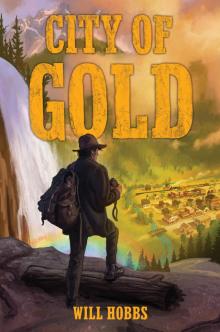 City of Gold
City of Gold Kokopelli's Flute
Kokopelli's Flute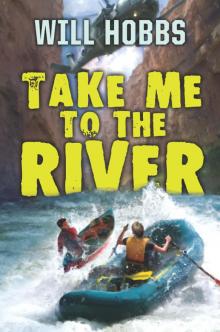 Take Me to the River
Take Me to the River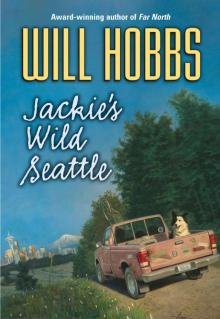 Jackie's Wild Seattle
Jackie's Wild Seattle The Maze
The Maze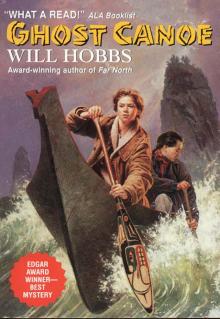 Ghost Canoe
Ghost Canoe Never Say Die
Never Say Die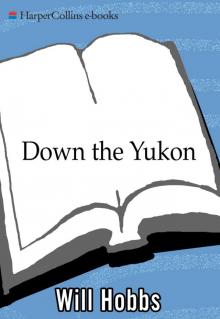 Down the Yukon
Down the Yukon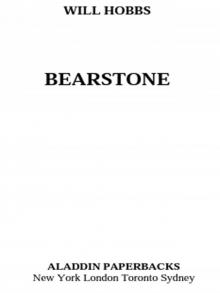 Bearstone
Bearstone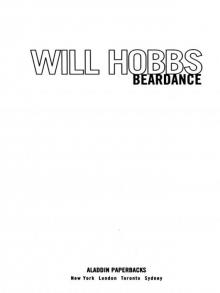 Beardance
Beardance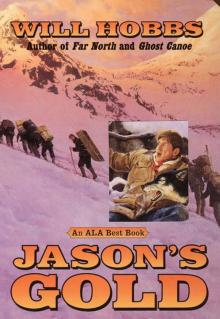 Jason's Gold
Jason's Gold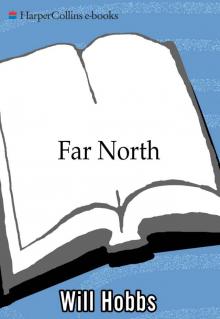 Far North
Far North The Big Wander
The Big Wander River Thunder
River Thunder Downriver
Downriver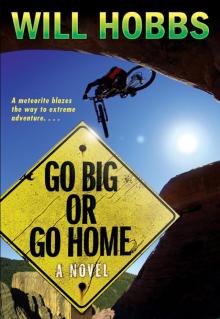 Go Big or Go Home
Go Big or Go Home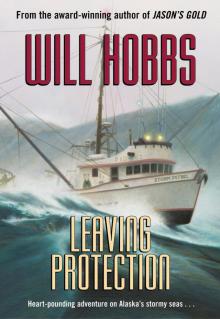 Leaving Protection
Leaving Protection Wild Man Island
Wild Man Island